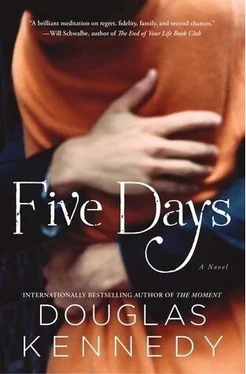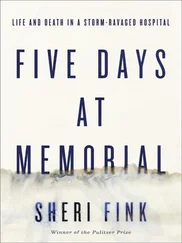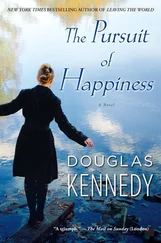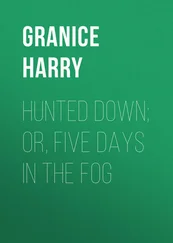Douglas Kennedy - Five Days
Здесь есть возможность читать онлайн «Douglas Kennedy - Five Days» весь текст электронной книги совершенно бесплатно (целиком полную версию без сокращений). В некоторых случаях можно слушать аудио, скачать через торрент в формате fb2 и присутствует краткое содержание. Жанр: Современная проза, на английском языке. Описание произведения, (предисловие) а так же отзывы посетителей доступны на портале библиотеки ЛибКат.
- Название:Five Days
- Автор:
- Жанр:
- Год:неизвестен
- ISBN:нет данных
- Рейтинг книги:3 / 5. Голосов: 1
-
Избранное:Добавить в избранное
- Отзывы:
-
Ваша оценка:
- 60
- 1
- 2
- 3
- 4
- 5
Five Days: краткое содержание, описание и аннотация
Предлагаем к чтению аннотацию, описание, краткое содержание или предисловие (зависит от того, что написал сам автор книги «Five Days»). Если вы не нашли необходимую информацию о книге — напишите в комментариях, мы постараемся отыскать её.
Five Days — читать онлайн бесплатно полную книгу (весь текст) целиком
Ниже представлен текст книги, разбитый по страницам. Система сохранения места последней прочитанной страницы, позволяет с удобством читать онлайн бесплатно книгу «Five Days», без необходимости каждый раз заново искать на чём Вы остановились. Поставьте закладку, и сможете в любой момент перейти на страницу, на которой закончили чтение.
Интервал:
Закладка:
As I clicked the phone shut it struck me that I hadn’t said: ‘Love you.’ Did I still love Dan? Did he still love me?
No. Not now. Not this weekend.
The endless refrain.
I stood up. I checked my watch. I glanced down at the convention welcome pack on the bed. I saw that the talk on ‘CT Scanning and Inoperable Stage Three Lung Cancer’ was beginning in ten minutes. Better than loitering in here, thinking, thinking. Imagine using a seminar like that the way most of us use a movie we know isn’t going to be very good — as a form of pure escapism. Still, anything is better than this room.
I grabbed my convention badge, attached to a red ribbon. I dropped it over my neck and gave myself a fast glance in the mirror, thinking: God, I’m looking older. Then I headed downstairs, thinking over that curious conversation I had with the insurance man from Bath — and how I had enjoyed the banter, the harmless flirtation, before he began to sound like a knee-jerk Republican.
No, that’s not fair. He was literate (who makes a reference to Nathaniel Hawthorne these days?) and clearly well-informed and, like me, nervously enjoying this exchange. And you overreacted when he said something that you took the wrong way.
Was I overreacting because I was flirting with him? Was my petulance bound up in the sense that I was doing something I shouldn’t have been doing. that I can never recall having done before during all the years of my marriage?
Oh, please. It was conversational give-and-take, nothing more. The guy was as awkward as you are — so it was clearly something he didn’t engage in very often either. But he was also far more intelligent than any insurance man you’ve ever encountered. not that you’ve exactly encountered vast numbers of men selling you indemnity against life’s possible horrors.
Still, I shouldn’t have snapped at him like that.
In the elevator going down to the main lobby there was a woman who stood about five foot four. Slight to the point of being petite, yet with eyes that seemed so animated. She was wearing a plain mid-brown pants suit. Her gray hair was cut simply. She was a woman so unimposing that you would pass her on the street without noticing her. Until you caught sight of her smile. A smile which hinted that she was one of those rare souls who have a sanguine way of looking at the world. I glanced at her conference badge: Ellen Wilkinson / Regional Memorial Hospital / Muncie, Indiana. Standing next to her (with her back to me) was a tall, spindly woman, also in her mid-fifties. As the elevator door closed behind me I heard Ellen Wilkinson tell this lofty woman:
‘. what can I say? I come home after a day full of horror in the scanning room. And Donald is there. And after thirty-eight years together I still look at the guy and think: Lucky me. And from the way he always smiles at me — even if he too has had a terrible day — I know he’s thinking the same thing. Lucky us.’
Out of nowhere I found myself lowering my head as my eyes filled up with tears. I turned away, not wanting these two women to see my distress; a distress that had caught me so unawares. But Ellen Wilkinson of Muncie, Indiana, clearly caught sight of my upset, as she put her hand on my shoulder and asked:
‘Are you all right, dear?’
To which I could only quietly reply:
‘Lucky you indeed.’
Then the elevator door opened and I walked straight into the seminar about ‘CT Scanning and Inoperable Stage Three Lung Cancer’.
Three
SOMEWHERE DURING THE third seminar of the late afternoon — no, it was now early evening — the thought struck me: I’ve not absorbed a word of anything I’ve heard. Deep technical discussions about the new MRI techniques for uncovering cerebral arterial sclerosis. A long, badly delivered, but still important (I suppose) paper from a research fellow at the Rockefeller Institute about the complexities of coronary valve imaging. Two radiographic technologists from St Louis doing a double act on a pioneering technique they developed for early ultrasound detection of ectopic pregnancies (I was cheered by my fellow technologists being saluted for a breakthrough that research scientists usually handle — and which they discovered through sheer application of all their years of technical knowledge). And a talk about advances in intravenous radiographic dyes and their heightened efficacy.
Yes, I did listen to everything being said in these back-to-back sessions. Yes, my brain occasionally did register interest in what was being discussed. But, for the most part of the long afternoon I spent in that large, overheated conference room, I was elsewhere. It was all due to that overheard conversation in the elevator. A declaration of long-term marital love that I’d never heard expressed in such a direct and simple and touching way. And behind my distress was a certain envy. How I so wanted to look at the man who shares my life and think: Lucky us. But that was simply not our story. And that made me cry. In public. A fact which so unnerved me. Because, yet again, tears arrived without warning, and I had let my guard down. The same heavily guarded self which had enabled me, for all these years, to never hint to anyone (outside of Lucy) that I come home to unhappiness night after night. Then again, I was brought up with the idea that complaining was a shabby thing to do. My mother couldn’t tolerate anyone who moaned about how difficult things were in their life. ‘You can complain all you want when you’re dead — and then not be able to do a damn thing about it. But while you’re alive and kicking, you just keep working. Complaining is lashing out against things over which you largely have no control. like the smallness of other people.’
Mom said all that to me on a Saturday afternoon four years ago when I went up to see her at her home. She had just completed her last chemotherapy session and was rail thin with little hair.
‘The oncologist is making all sorts of noises about him being the General Patton of cancer doctors, and leading an onslaught against all those crazy T-cells that have landed me in this mess. But I’m not convinced.’
‘Oncologists rarely say positive things until they believe they can deliver good results,’ I said.
‘Well, this guy would tell a man already half-eaten by a shark: “Hang in there, there’s still a way out of this.” But I know my body better than anyone. And my body is telling me: This is a battle we’re going to lose. I am resigned to that. Just as I am resigned to the fact that I should have done more with the time I had. ’
‘Mom, you’ve done loads. ’
‘Now you are talking nonsense. I’ve had a rather small, little life. Outside of your father, yourself and a few friends, my passing will be noted by no one. I am not being excessively morbid, just honest. I have spent my whole life in one corner of Maine. I have worked in a library. I have been married to the same curious man for forty-four years and have raised a daughter — who is a much more accomplished person than she gives herself credit for. And that’s about the sum total of it all. besides the fact that I should have made more of things over the years.’
That last sentence came back to haunt me many times after her death. Just as it returned yet again today as I sat through the final session of the early evening, listening to a ‘radiology fellow’ at the Rockefeller Institute engaging in a long, wildly technical discourse on future possibilities of imaging early-stage cancer. Might a next-generation MRI system actually trope malignant cellular activity? Had it been functioning three years ago would it have helped detect the pancreatic cancer early enough to save my mother? Then again, pancreatic cancer is a largely silent disease; ‘the Trojan Horse of cancers’, as my mother’s oncologist described it, and almost always a death sentence. The problem with life-taking illnesses is: you can never completely control them. You can zap them, tame them, try to get them to disintegrate or take another course. Even when subdued or even temporarily vanquished they so often reassemble their forces for another toxic push for control. In this sense you can’t truly control their strange logic any more than you can control the actions of someone whose behavior you want to change. or, worse yet, whom you want to love you.
Читать дальшеИнтервал:
Закладка:
Похожие книги на «Five Days»
Представляем Вашему вниманию похожие книги на «Five Days» списком для выбора. Мы отобрали схожую по названию и смыслу литературу в надежде предоставить читателям больше вариантов отыскать новые, интересные, ещё непрочитанные произведения.
Обсуждение, отзывы о книге «Five Days» и просто собственные мнения читателей. Оставьте ваши комментарии, напишите, что Вы думаете о произведении, его смысле или главных героях. Укажите что конкретно понравилось, а что нет, и почему Вы так считаете.












